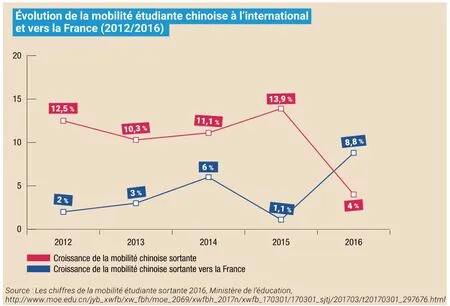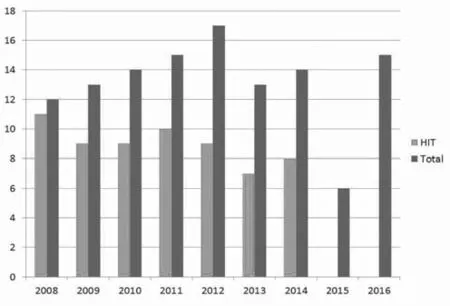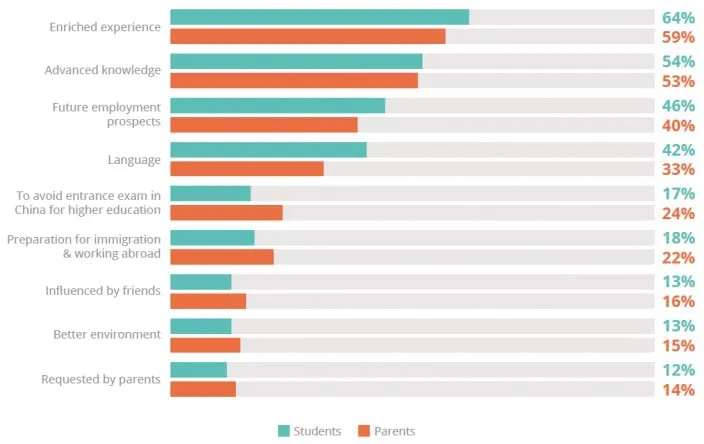UB-HIT International Master Progamme: Past,Present and Future
David Chen , Grégory Zacharewicz
Abstract: Internationalization of higher education is a strategic long term policy for both University of Bordeaux (UB) and Harbin Institute of Technology (HIT). The collaboration of the joint master program between University of Bordeaux and Harbin Institute of Technology started in 2006.This paper first reviews student's mobility between France and China and recalls the past joint master program between HIT and UB. Then the current collaboration with HITWH is presented.The emphasis of the paper is focused on future perspectives to improve and strengthen the collaborations with both HIT and HITWH.
Key words: joint master program; international education collaboration
1 Introduction
The mobility of students and internationalization of higher education is a key issue, not only at education level but also for further developing an open and free economic in the world. In 2015, the most represented country among the foreign students in France was Morocco (37 000), followed by China (28 000), and Algeria (23 000). The numbers below (see Fig.1),which are in thousands, highlight how many more students are choosing to study internationally.
France is not the first destination of international students for mobility. A study realized in 2016 shows that France occupies the 8th position of numbers of Chinese students after US, Japan, Canada, Australia,etc. Since 2015, the global growth of Chinese students studying abroad starts to decrease while it increases for France as shown in Fig. 2. France becomes an attractive country for Chinese students compared to the rest of the world.

Fig. 1 Mobility of international students.

Fig.2 Mobility of Chinese student (France).
The joint master program on Enterprise Computing and Engineering between University of Bordeaux (UB)and HIT started on 2006. The aim of this program is to provide a high-level education environment for HIT and UB students in the domain of both enterprise engineering and software engineering[1]. Since then,this program has evolved in many aspects. This paper aims at providing an analysis of strong points and possible ameliorations to maintain and further develop the collaboration between UB and HIT in the future.
This paper is organized as follows. After introduction in section 1, Section 2 recalls the past UBHIT collaboration in the period of 2006 - 2014. Section 3 presents the on-going collaboration with HITWH starting in 2017. Section 4 tentatively identifies and discusses future collaboration challenges and opportunities. Section 5 concludes the paper.
2 The Past Collaboration with HIT
The education collaboration between University of Bordeaux and Harbin Institute of Technology was based on a long-term research collaboration in the domain of Enterprise Modelling, Integration and Interoperability from 1991 and 2004. It is also based on the mutual trust between two key persons: Prof Guy Doumeungts at UB side and Prof Xiaofei Xu at HIT side. At the end of 2004, both sides considered important to extend the research collaboration to education collaboration. A series of activities and actions were launched to prepare the implementation of a joint UB-HIT master programme. After 2 years of discussion and preparation, the joint master was launched in 2016[1-2].
This joint master programme consists in two years of training. In the first year, the courses are hold in HIT including Language, Science and Methodology and IT Technique. In the second year, the courses are hold in UB focusing on enterprise engineering, modeling,project management and interoperability.
The joint UB-HIT master collaboration agreement has been signed in 2016 and the first class of students were recruited the same year in Harbin and graduated in 2008 in Bordeaux. Fig. 3 shows the variation of number of students enrolled each year.

Fig.3 Evolution of graduated students [3].
As shown in the figure, the HIT master students enrolled in this program started to decrease in 2013 and stopped in 2015. There are several reasons, such as the change of recruitment policies and admission criteria in China and more attractive Chinese employment market for software engineering graduates. As a consequence, in 2015, the International master at University of Bordeaux extended the recruitment to international students of all countries in the world and is re-organized in 1 year program at level of Master 2.
However, both France and China consider student’s mobility as a strategic investment. University of Bordeaux has adopted a more active policy to internationalize its higher education. Among various student’s mobility options, University of Bordeaux has put emphasis on long-term institution-based joint education programmes with key universities,countries and regions. Because of the long history of collaboration with HIT and good results achieved in the past, we are encouraged to seek new opportunities to continue the collaboration with HIT.
3 The Present Collaboration with HITWH
Since 2015, discussion started with HITWH (Weihai Campus) to look for possibilities of reactivating the collaboration. As there is no running master programme taught in English in HIT Weihai, it is not possible to implement joint master programme with double diplomas.A new collaboration model is proposed as follow.
(1) Develop a collaborative master collaboration to receive selected HITWH bachelor students in Bordeaux: Because of the difficulties to recruit master 1 students in HITWH, it has been considered to select some best bachelor students graduated in HITWH to enroll in the year 2 of the International Master on Enterprise Engineering (previous Y2 joint UB-HIT master programme).
(2) Inplementating a selection process of two steps:The first step is carried by HITWH which consists in selecting good students based on their bachelor study’s scores and English level. Then comes the second step performed by University of Bordeaux to propose a written exam and interview at HITWH to validate the qualification of selected candidates.
(3) The recruitment is extended to HITWH students of all scientific and technological disciplines such as for example, Information and Computing science,Mathematics and Applied Mathematics, Mechanical engineering, Environmental engineering, welding technology and engineering, civil engineering,Material forming and control engineering, Chemical Engineering and Technology.
(4) The admitted students come to Bordeaux in September and follow the first semester (lectures and exams) from September to December. In the second semester, they will perform a project (1 month) and an internship (4~5 months). The internship is organized only with UB professors to validate the master.
The first batch of students (4 students) were selected and enrolled in September 2017 in an international class with 22 students coming from various countries(Germany, Canada, UK, India, Vietnam, Pakistan,Colombia, Brazil, Egypt, China, Armenia…). Some remarks can be made as follows.
(1) All the four students have never studied enterprise engineering in their bachelor studies before but they can follow all the lectures with any problem.One student has been ranked 1st in exams. The others have also obtained good results.
(2) In the second semester, they are all in internship (5 months). All the four students accepted mobility; two students are in internship in IPK Berlin (Germany) and two others in Rome (Italy).
(3) Compared with students of other nationalities,students from HITWH are more attentive during lectures but also less active and asking few questions.The English level of some students are not as good as those coming from other countries.
(4) Compared with students coming from HIT during the past collaboration between 2006 and 2014,there is no significant differences observed although students coming from HITWH have heterogeneous background (not all from software engineering).
(5) Concerning the future carrier, one weak point is that the students seem not having a clear idea of what they will do. Some of them hesitates between continuing in a PhD study and finding a job in industry.
4 Future Collaboration Perspectives
As pointed previously, both University of Bordeaux and Harbin Institute of Technology (Harbin and Weihai) have considered the internationalization of their higher education as a long-term strategy. This section tentatively identifies and discusses possible collaboration models between the two universities in the future. First of all, it is important to understand the raisons why Chinese students study abroad in order to propose adequate programs.
Fig. 4 shows the motivations of Chinese students who went abroad to carry out their studies. We can see that the first motivation is to‘ enrich personal exeprience’ and open-mindedness.‘ Learn advance knowledge’ only comes to second position. The parents sometimes have different motivation then students themselves. The perspective of employement is also an important motivation (4e position)[4]. Because of the attractiveness of Chinese market, in 2016, 80% of Chinese students come back to China after study while it was only 30% in 2006.

Fig.4 Raisons of Chinese students go abroad [4].
Fig. 5 shows the distributions of Chinese students studying in France in various disciplines and levels during the period of 2016—2017. The students enrolled in a master program were only 39% and 12% in a PhD while those in a bachelor program increased to 49%.Science and technology remain attractive with 32%of Chinese students compared to Literature and Social science (26%) and Science of economy (25%). Based on this observation, the future collaboration between UB and HIT needs to diversify the offers and pay more attention to the bachelor level studies[3].

Fig. 5 Distributions of Chinese students in France.
(1) First it is important to relaunching the joint UBHIT master programme in HIT (Harbin) as defined in the past collaboration during the period of 2006-2014. An informal exchange has been done between the department of international relation of the two universities and both sides expressed intension to reactive and extend this type of collaboration at master level.
The advantage of this collaboration is to allow students to obtain in two years two complementary master diplomas of the two countries (France and China).
The main difficulty is to recruit students. Some Chinese professors prefer keeping their students in China to work on their own projects rather than to letting them going abroad.
(2) Second it is interesting to generalize in HIT the 4+1 model currently running in HITWH. Selected good bachelor students come to Bordeaux to follow Master 2 programme on Enterprise Engineering. This model can be more attractive to some bachelor students.
The advantage of this collaboration is to allow some selected good bachelor students to obtain a master diploma in just one year. This master diploma is recognized in France and in China.
The main issue is to carry out and coordinate at the university level (HIT) the advertising and selection of good students enrolled at bachelor level in various departments of the university.
(3) Third besides of the two models above allowing a student to obtain either one or two master diplomas,it is also interesting to investigate the possibilities to develop potential non-diplomation collaborations at bachelor level. This would be carried out in two different ways.
HIT bachelor students can register and follow the Minor option courses offered by University of Bordeaux that are taught in English. Those Minors options proposed to UB students majoring in computer science at the level of bachelor year 1 to year 3. In 2018, available minor courses are in biology, biosourcing, computer science, mathematics,epistemology and history of science and enterprise engineering. Each Minor course has 6 ETCS and is based on eLearning and regular interaction session with professors.
HIT bachelor students can come to Bordeaux for 1 or 2 semesters to follow some lectures taught in English in computer sciences as well as in some other scientific disciplines. At the time being, there is no a complete bachelor program that is entirely taught in English. As a consequence, HIT students cannot obtain UB bachelor degree with limited English course offers.The advantage of this model is to allow HIT bachelor students gaining some international experiences in France and Europe and improving their English.
(4) Finally, last but not least, University of Bordeaux also offers more than ten international master programs(besides of enterprise engineering) that are taught in English. It is also possible to launch collaboration between various departments of both UB and HIT to establish joint master programs based on the model of joint master on enterprise computing and engineering.
5 Conclusion
Since several years, France is becoming more attractive choice for Chinese students. Although the collaboration between UB and HIT has uncounted some problems and challenges in the past, both sides have wishes to maintain and further develop the collaboration in the future. In this perspective,it is important to better understand the changes in the demand and to propose programs adapted to the Chinese students. Besides of reactivating the 4+1+1 model experience in the past several new options can be proposed.
(1) Extend the 4+1+1 model to other scientific disciplines with the advantage to deliver two master diplomas;
(2) Propose 4+1 model for selected good bachelor students in HIT to obtain master diploma of University of Bordeaux;
(3) Develop non-diplomation model at bachelor level to welcome HIT students in Bordeaux to follow some courses taught in English in Computer science and others;
(4) Experiment eLearning model for Minor courses taught in English at HIT campus.
- 计算机教育的其它文章
- Iterative Case-Driven Method and Practice of Java Language Teaching
- The Reform Scheme of Practice-Courses Cooperation Training Pattern of Software Engineering Major of Overseas Chinese Universities
- Evaluating students’ learning situations using“Four-quadrant law”
- The MOOC/SPOC Based “1+M+N”Multi-University Collaborative Teaching and Learning Mode: Practice and Experience
- Practice and Study of Training Model for Professional Master Degree in Software Engineering
- Construction and Practice of Cloud-based Experiment and Innovation Project Supporting Platform for Computer Science Education

